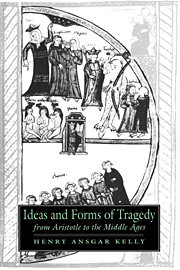1 - Greek and Roman poetics
Published online by Cambridge University Press: 22 September 2009
Summary
In any modern discussion of tragedy, Aristotle almost always has some role to play, whether on center stage or whispering from the wings. But the Poetics was not known to Latin Antiquity, and it was badly misunderstood or neglected when it finally came to light in the thirteenth century. And since our present enterprise is primarily concerned not with what we think about tragedy (or with what we think Aristotle thought about tragedy), but rather with what was thought about tragedy in the Middle Ages, we shall not have to be much concerned with Aristotle's views.
But there are, I think, good reasons for taking a brief look at the contents of the Poetics: first to dispel widespread misapprehensions of Aristotle's generic views on tragedy, and second to provide ourselves with a basis of comparison with Latin poetic theory. We shall, in fact, be able to see that Aristotle's broadest characterization of tragedy was transmitted to the Latin world by his disciple Theophrastus, as witnessed explicitly by the grammarian Diomedes.
ARISTOTLE ON THE TRAGIC IN GENERAL
In the second chapter of the Poetics, Aristotle introduces the epithets spoudaion and phaulon, which are essential to his definitions of tragedy and comedy. The terms may be given in English form as “spudean” (rhyming with “Judean”) and “phaulic.” For the purposes of artistic imitation, men are either spudean (above the average, of high character, good, superior, noble, heroic) or phaulic (below the average, of low character, inferior, bad, ignoble).
- Type
- Chapter
- Information
- Publisher: Cambridge University PressPrint publication year: 1993



